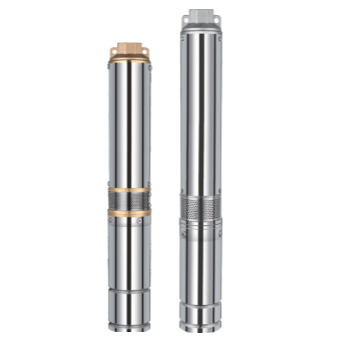Solar-Powered DC Water Pump: Harnessing Sustainable Energy for Efficient Water Supply
Publicado 2024-03-18 02:00:57
0
5K

In the pursuit of sustainable and efficient water management solutions, the integration of solar-powered DC water pumps has emerged as a viable option, particularly in regions where access to electricity is limited. These innovative systems utilize solar energy to power water pumps, offering an environmentally friendly alternative to traditional diesel or electric pumps. One notable application of this technology is in deep well pumping, where solar-powered systems provide a reliable and cost-effective means of accessing groundwater for various purposes, including irrigation, livestock watering, and domestic use.
The solar powered DC water pump operates by converting sunlight into electricity through photovoltaic panels, which are typically installed adjacent to the pumping system. This electricity is then utilized to drive a direct current (DC) motor, which powers the pump mechanism. Unlike conventional AC pumps, which require grid connectivity or diesel generators, DC pumps offer greater flexibility and autonomy, making them well-suited for remote or off-grid locations.
One of the key advantages of solar-powered DC water pumps is their efficiency in harnessing solar energy. By directly converting sunlight into electricity without the need for intermediate steps, such as energy conversion and transmission, these pumps can operate with small energy losses. This efficiency not only reduces operating costs but also maximizes the utilization of available solar resources, making them an attractive option for sustainable water management initiatives.
In the context of deep well pumping, solar-powered systems offer several distinct benefits. Firstly, they provide a reliable and continuous water supply, even in remote areas where grid electricity is unavailable. This reliability is crucial for agricultural activities, where access to water is essential for crop irrigation and livestock hydration. Additionally, solar-powered pumps are environmentally friendly, producing zero greenhouse gas emissions during operation, unlike diesel pumps that contribute to air pollution and carbon emissions.
Furthermore, the modular nature of solar-powered DC water pump systems allows for scalability and customization to suit specific water requirements. Whether it's a small-scale irrigation project or a large-scale agricultural operation, solar-powered pumps can be tailored to meet varying demands. This flexibility extends to the design and installation of the pumping infrastructure, with options for surface-mounted or submersible pumps depending on the depth and accessibility of the well.
Another advantage of solar-powered DC water pumps is their low maintenance requirements. With fewer moving parts compared to traditional pumps, they are less prone to mechanical failures and require small servicing over their lifespan. This translates to reduced downtime and lower maintenance costs for end-users, further enhancing the economic viability of solar-powered water pumping solutions.
Despite these benefits, the widespread adoption of solar-powered DC water pumps faces some challenges, particularly in terms of upfront costs and technical expertise. While the long-term operational savings can offset initial investments, securing financing for solar-powered projects remains a hurdle for many communities and organizations, especially in developing regions. Additionally, the installation and maintenance of solar-powered systems require specialized knowledge and skills, which may not be readily available in certain areas.
To address these challenges, initiatives aimed at promoting renewable energy adoption and capacity building are essential. Government incentives, subsidies, and financing schemes can help reduce the financial barriers associated with solar-powered water pumping projects, making them more accessible to a wider range of users. Moreover, training programs and technical assistance initiatives can empower local communities and technicians to install, operate, and maintain solar-powered systems effectively.
In conclusion, solar-powered DC water pumps represent a promising solution for sustainable water management, offering efficiency, reliability, and environmental benefits. From small-scale agricultural applications to large-scale water supply projects, these systems have the potential to revolutionize the way we access and utilize water resources, particularly in off-grid and underserved areas. By harnessing the power of the sun, we can create a more resilient and equitable water infrastructure for future generations.
Buscar
Categorías
- Art
- Causes
- Crafts
- Dance
- Drinks
- Film
- Fitness
- Food
- Juegos
- Gardening
- Health
- Inicio
- Literature
- Music
- Networking
- Otro
- Party
- Religion
- Shopping
- Sports
- Theater
- Wellness
Leer más
AAPE與BAPE外套:潮流之巔的時尚宣言
在時尚界的浩瀚星空中,AAPE與BAPE猶如兩顆璀璨的雙子星,以其獨特的設計語言、卓越的品質以及深厚的潮流文化底蘊,持續引領著街頭時尚的潮流趨勢。今天,我們將聚焦於這兩款品牌的外套系列,深入探索...
Dimethyl Sulfoxide Market Size, Estimation, Dynamics and Forecast, 2023-2032
The Dimethyl Sulfoxide (DMSO) Markett Report provides statistical information about the...
Best Online Scratch Cards - Scratch & Win Instantly
If you love the thrill of gambling but prefer a quick and straightforward game, then online...
Report: Two European Giants Will No Longer Be Available in EA Sports FC 25
As the release of EA Sports FC 25 approaches, fans are eagerly awaiting the second...
Funko Pop Mania: Why These Collectible Toys Are a Must-Have for Kids
In today's world, where digital entertainment seems to dominate, there's a charming...
© 2024 Scenario.press - libera espressione
 Spanish
Spanish


